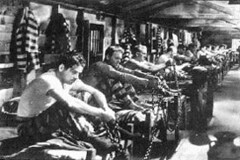1. ELIMINATE all prison-camp facilities. Send the prisoners home with bracelet monitoring. Camp inmates are nonviolent and no flight risk. Prison camps exist only to furnish involuntary labor for Bureau of Prisons industries.
2. ELIMINATE mandatory minimum sentences and sentencing guidelines; they are excessively cruel and inhumane. Return sentencing discretion to the courts. Reestablish the balance of power in government.
3. MANDATE probation for first-time offenders. Many of the prisoners here are first-time convicts. Their long sentences make them needless martyrs. Long sentences definitely contribute to recidivism. The option of probation will promote resurrection of lawful lifestyles.
4. RETURN parole to the federal prison system. Parole rewards good behavior, provides motivation for reform, allows prison populations to decline, and tests early the ability of the convict to rejoin society. There is no pragmatic rationale for eliminating the parole system.
5. ELIMINATE involuntary servitude. This historical remnant should be severed. Slave-labor camps cannot morally be society's answer to punishing criminals. If prison industry is to continue, pay the inmates the minimum wage; the industry will still flourish.
6. RESTORE conjugal furloughs. The cruelest, most dehumanizing aspect of federal prison life is the forced celibacy entailed within it. The sublimations are horrific. The inmate's essential character is twisted and deformed. Let your imagination smolder on the gruesome substitutes created by prison life. There is no psychological recovery from this privation.
7. ELIMINATE informants from our system of justice. They are singularly responsible for more miscarriages of justice than any other component. The "Judas," the "rat," is universally scorned and isolated at prison camp. The inmate sanction imposed ranges from urination on the informant's bed to assault.
8. RESTORE education and job training. Bring back rehabilitation efforts. The puny efforts at education and job skills are laughable. Most prisoners really care about future success. A prisoner who becomes educated and secures a good-paying job is far less likely to re-offend.
9. IMPROVE library facilities. The so-called law library is a sick joke at Lompoc Prison Camp; it consists of a small collection of outdated codes and cases and a few form books. The remainder of the library is a random scattering of paperback books and old public library discards. Prisoners do seek to further their mental awareness through reading. Why deny us books?
I hope you'll read all of Tony's letter. And eliminate the words "Club Fed" from your vocabulary. There no longer are such places. There are only forced labor camps.
Update: If you want to hear Tony speak about his experience, come to Aspen June 9 to 10 for the NORML Legal Seminar. While the program is a Continuing Legal Education program for drug defense lawyers, you don't have to be one to register, and there's a reduced rate for non-lawyers.
An added plus is that Tommy Chong will be a keynote speaker and we'll be spending Sunday at Hunter Thompson's Owl Farm, courtesy of Hunter's wife Anita.
America, prison nation. Come spend a few days with those of us who oppose the draconian penalties for non-violent drug offenses.




